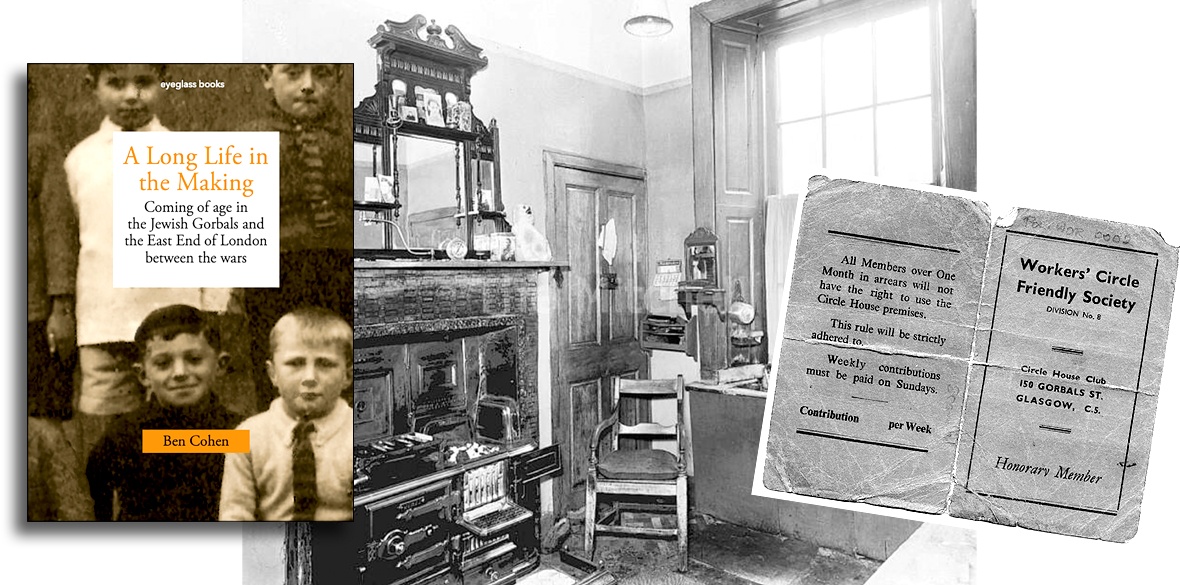This is the last article you can read this month
You can read more article this month
You can read more articles this month
Sorry your limit is up for this month
Reset on:
Please help support the Morning Star by subscribing here
A LONG Life in the Making – coming of age in the Jewish Gorbals and the East End of London between the wars
by Ben Cohen
eyeglass books £7.95
THE origins of Ben Cohen’s memoir lie within the late 19th-century Jewish community of Vitebsk, Byelorussia. In the 1890s around 35,000 Jews lived in Vitebsk; over 50 per cent of the total population, making the city a major hub of Jewish religious, cultural and political life. For example, the Art School produced two painters of world renown – Chagall and El Lissitsky.
The gross discrimination against Jews, their generally dismal living conditions with the constant presence of malnutrition and disease gave rise to political organisations such as the General Jewish Labour Bund, whose goal was to attract Jews to the growing Russian revolutionary movement.
One of the first branches of the Bund was established in Vitebsk and Ben Cohen’s father Philip was a member. During the 1905 revolution the activities of the Bund led to such persecution that Philip Cohen had to flee for his life, ending up in Glasgow where his son Ben was born in 1915.
In the early 20th century most of the 7,500 Jews in Scotland lived in the Gorbals, largely immigrants from the Russian empire. Philip Cohen became a pedlar of drapery goods which he hawked around the mining villages of Lanarkshire and brought his family up in a tenement.
Philip was a founder member of The Workers Circle, a Jewish socialist society, later joining the ILP which Ben joined too aged six. Here began a lifelong commitment to working-class struggles from which he never wavered. His description of standing on a horse-drawn cart at the age of six, ringing a handbell and shouting “Vote for John McLean” is a memorable one.
Ben grew up in the Gorbals in a tightly knit immigrant community and it is his reminiscences that form the main part of this book, which takes the form of a series of letters to his son, in which he reviews his early life and sets it in its historical and social context.
His memories of his upbringing are vivid in their detail, yet neither sensational nor sentimental. The clarity and directness of the writing, with its dry sense of humour, give the impression of the spoken word rather than a piece of prose.
Trained as a doctor in Glasgow, Ben first practised in the London Jewish Hospital in Whitechapel and peppers his memoir with many amusing, but also some very serious anecdotes about his early years in medicine before the NHS.
Having had several run-ins with sadistic teachers and the police as a boy, Ben retained his anti-establishment views all his life. He recounts one confrontation with the police which happened when he was a mature, highly respected surgeon, commenting contemptuously: “Bullies and liars. Police, church and state, the unholy trinity of oppression, guile and force.”
The introduction to the book, its afterword and appendix have been the contribution of Ben’s son Phil and deserve discussion in their own right.
While editing the text for publication, Phil Cohen ensured that content relating to the labour movement, pre-NHS medical history and the culture of left-wing Jewish life were retained and he explains his father’s desire to impart knowledge of working-class struggles such as Red Clydeside, the General Strike and the Spanish Civil War to him.
Phil’s appendix is particularly interesting, containing a discussion of literature about the Gorbals, generally written by outsiders trying to shock with tales of razor gangs, or else creating an unrealistically nostalgic impression of life in a slum.
Ben Cohen’s writing however takes its place alongside other oral history produced by people who actually lived and had their roots in the Gorbals, and is a valuable addition to the genre, enhanced by the additional material and reflections of his son Phil.
Ben had once said to him “We never quite know what the times we live through will mean for future generations, but the least we can do is help them understand what we were fighting for.”










